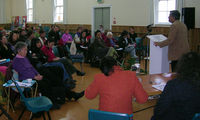 Ethnic and P%u0101keh%u0101 New Zealanders came together last month to discuss identity and dominance in this colonised land.
Ethnic and P%u0101keh%u0101 New Zealanders came together last month to discuss identity and dominance in this colonised land.
On 9 and 10 June, St Anne’s Hall, Newtown, was the venue for one of the best conferences I have been to in the last few years.
Organised by a small group of Wellington-based P%u0101keh%u0101 and New Zealand-born Chinese, we were given the opportunity to explore what it is to be a New Zealander and how we identify ourselves and each other.
Over the two days, we were treated to three keynote speakers and a series of panellists. On Saturday we heard about the construction of NZ’s national identity and how race influenced this, issues of whiteness in pursuing justice in Aotearoa, and ‘Native P%u0101keh%u0101’—where P%u0101keh%u0101 indigeneity is a useful foil to M%u0101ori indigenous rights.
Building identity
The first keynote speaker, Avril Bell, set the tone for the morning, speaking about dominant culture and the construction of P%u0101keh%u0101 identity as, over the years since colonisation began, we have not only been able to outnumber the tangata whenua, we have been able to forget where we came from. We now have a situation where to be ‘kiwi’ is synonymous with being white/P%u0101keh%u0101/European and where being white means it is assumed that you are a kiwi.
She talked about the politics of disappointment and challenged us to address our historical amnesia. She also made the point that it is we P%u0101keh%u0101, the political descendants of the colonisers, who have come to see ourselves as ‘The’ People. The problem for us is that we are not ‘the FIRST’ people!
How long does it take?
In the afternoon Wong Liu Shueng spoke about growing up in small-town New Zealand and about her growing awareness of racism, of how prejudice learnt early is never re-examined, and how experiences of life have been the motivation to work on issues of racism, minority groups, and power relationships. As a fifth generation New Zealander, she raised the question of ‘How long it takes before we are considered NZers’.
The afternoon panel dealt with white privilege and dominance and featured two women panellists who were immigrants to New Zealand, both activists who asked searching questions about where we are heading as a society. We were also treated to poetry from poet Alison Wong who was the 2002 Robert Burns Fellow at Otago University.
Underlying the whole day for me, from all the speakers and panellists was the ‘longing to belong’.
The politics of identity
The Sunday was headlined ‘Beyond dominant culture: creating new dynamics’ and Moana Jackson, Ngati Kahungungu, Ngati Porou, titled his keynote speech ‘The Politics of Identity’.
He spoke of M%u0101ori having whakapapa which determined relationships. (Papa being a foundation, whaka to make or build on.)
New words for newcomers
For M%u0101ori, identity was not a racial or an ethnic classification but a definition based on relationships. When P%u0101keh%u0101 arrived, they were a different people who didn’t fit into the M%u0101ori world and relationships, so words had to be devised to describe these people. These were a different set of relationships that grew from a different place.
The panel that followed also continued the theme of identity, including the politics of multiculturalism and minorities, challenging the connection of ethnic with the exotic—asking, ‘What’s in it for me?’ and about P%u0101keh%u0101 becoming open to what they don’t know and not needing to know everything.
One speaker talked about the need to separate the nation from the state. The point was made that the dominant culture decides the rules of the game and who the insiders and outsiders are.
Forward pathways
The afternoon opened with an exercise run by two M%u0101ori women counsellors who got us to critique the North American models of counselling that are now being used here to train students.
The final panel was titled ‘Ways Forward—envisioning future paths’ where four panellists shared information and experiences of how to build to sustain struggle, about Pacific minorities thriving in other dominant cultures, a new paradigm for a multiethnic Aotearoa and a warning of what can happen if the dots don’t join in creating models within a dominant culture.
All in all, our bodies, minds and spirits were well cared for with good food, information and inspirational speakers who shared with openness, good humour, and patience.
It was a time to rekindle old relationships and initiate new ones, and it was a privilege to have the opportunity to participate in such a ground-breaking conference, one whose time has well and truly come.
Suzanne Menzies-Culling was born and bred in Dunedin. She has three sons and is a P%u0101keh%u0101 of Irish, Scots, English and Antiguan descent. She runs workshops for P%u0101keh%u0101 and other Tauiwi under the name, Tauiwi Solutions.
www.tauiwisolutions.org.nz